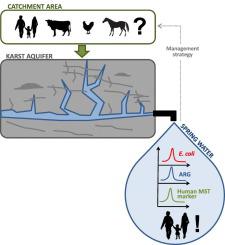Science of the Total Environment ( IF 9.8 ) Pub Date : 2020-06-25 , DOI: 10.1016/j.scitotenv.2020.140529 C Stange 1 , A Tiehm 1

|
The emergence of antimicrobial resistances causes serious public health concerns worldwide. In recent years, the aquatic ecosystem has been recognized as a reservoir for antibiotic-resistant bacteria and antibiotic resistance genes (ARGs). The prevalence of 11 ARGs, active against six antibiotic classes (β-lactams, aminoglycosides, tetracycline, macrolides, trimethoprim, and sulfonamides), was evaluated at a karst spring (Gallusquelle) in Germany, using molecular biological methods. In addition, fecal indicator bacteria (FIB), turbidity, electrical conductivity, spring discharge, and microbial source tracking markers specific for human, horse, chicken, and cow were determined. The ARGs most frequently detected were ermB (42.1%), tet(C) (40.8%), sul2 (39.5%), and sul1 (36.8%), which code for resistance to macrolides, tetracycline and sulfonamides, respectively. After a heavy rain event, the increase in FIB in the spring water was associated with the increase in ARGs and human-specific microbial source tracking (MST) markers. The determined correlations of the microbiological parameters, the observed overflow of a combined sewer overflow basin a few days before the increase of these parameters, and the findings of previous studies indicate that the overflow of this undersized basin located 9 km away from the spring could be a factor affecting the water quality of the karst spring. Our results provide a scientific basis for minimization of the input of fecal pollution and thus ARGs into the karst spring.
中文翻译:

德国岩溶泉水中的抗生素抗性基因和微生物源追踪标记的出现。
抗菌素耐药性的出现引起世界范围内严重的公共卫生问题。近年来,水生生态系统已被公认为是抗生素抗性细菌和抗生素抗性基因(ARG)的库。使用分子生物学方法在德国喀斯特温泉(Gallusquelle)评估了对6种抗生素(β-内酰胺类,氨基糖苷类,四环素类,大环内酯类,甲氧苄啶和磺酰胺类)有活性的11种ARG的患病率。此外,还测定了人类,马,鸡和牛特有的粪便指示菌(FIB),浊度,电导率,弹簧排泄物和微生物源追踪标记。最常检测到的ARG是ermB(42.1%),tet( C)(40.8%),sul2(39.5%)和sul1(36.8%),分别代表对大环内酯类,四环素和磺酰胺类的耐药性。大雨过后,泉水中FIB的增加与ARGs和人类特异性微生物源跟踪(MST)标记物的增加有关。确定的微生物参数之间的相关性,在这些参数增加前几天观察到的联合下水道溢流池的溢流,以及先前研究的发现表明,距春季9 km的这个过小盆地的溢流可能是影响岩溶泉水水质的一个因素。我们的结果为最大限度地减少粪便污染以及因此将ARGs引入岩溶泉水提供了科学依据。


























 京公网安备 11010802027423号
京公网安备 11010802027423号